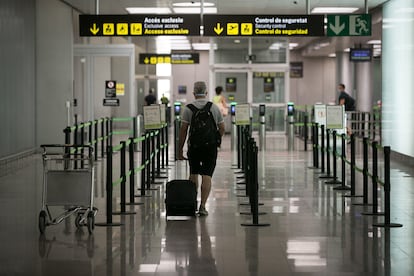Spain will require a negative PCR test from travelers coming from more than 60 countries
The measure goes into effect on November 23 and affects residents from most European Union member states

Spain will demand a negative PCR test taken no more than 72 hours before arrival from all travelers coming from countries in high coronavirus risk zones, said the Health Ministry on Wednesday.
The measure will go into effect on November 23. According to Health Minister Salvador Illa, the government had considered the possibility of introducing a quarantine, but finally opted for a PCR test. This will not be required of people coming in through land borders, only those travelers coming by sea or air.
In the case of EU countries and those in the European Economic Area, Spanish authorities will rely on the risk map offered by the European Center for Disease Control (ECDC), based on an EU Recommendation from October 13 asking member states for coordinated restrictions on travel.
For third countries outside this area, the reference point will be the 14-day cumulative coronavirus incidence for every 100,000 inhabitants, as well as their core capacity as set out in International Health Regulations (IHR). Citizens of countries with an incidence figure of over 150 will be asked for a negative PCR test.
Authorities may request to see the result of the test, which must be an original document, written either in Spanish or in English, and which may be presented in paper or electronic format
In an announcement published on Thursday in Spain’s Official Gazette, the government offered more details about the new requirement and provided a list of 65 affected countries and territories, which include the United States, the United Kingdom, Germany, the Netherlands, Ireland, France, Belgium, Italy, Argentina, Switzerland and Russia. (see bottom box for full list).
This list will be reviewed every 15 days and the update will be available on the Health Ministry website and on the Spain Travel Health website.
In the Official Gazette announcement, the government also confirmed that for now only PCR tests will be accepted, not antigen tests or antibody tests such as ELISA, CLIA or ECLIA.
Starting on November 23, passengers filling out a health control form before entering Spain (available on www.spth.gob.es or through the free app SPAIN TRAVEL HEALTH-SpTH) will find an additional question asking whether they have a negative PCR test result taken over the previous 72 hours.
Authorities may request to see the result of the test, which must be an original document, written either in Spanish or in English, and which may be presented in paper or electronic format, according to the ministry.
By sea or air
The Gazette adds that “passengers arriving in Spain by sea and those arriving by air who, exceptionally, were unable to fill out an electronic health control form, may show a paper form before boarding, as an alternative to the QR code. In this case, the form must be accompanied by the document certifying that the diagnostic test has been done.”
The Canary Islands, which currently have the best coronavirus situation in Spain, recently approved a similar measure that is set to go into effect on November 14. But in this case it affects both foreign and Spanish tourists, who will not be allowed into a hotel or other tourist accommodation without a negative test taken within the last 72 hours.
For now there are no plans for other regional governments to follow suit and ask tourists from other parts of Spain to produce a negative PCR test in order to stay at a hotel or holiday rental.
LIST OF COUNTRIES AND TERRITORIES
IN THE EU/EEA
Austria
Belgium
Bulgaria
Croatia
Cyprus
Czech Republic
Denmark (except Faroe Islands and Greenland)
Estonia
France
Germany
Greece (except the regions of Kitri, Ionia Nisia, Dytiki Ellada and Sterea Ellada)
Hungary
Iceland
Ireland
Italy
Latvia
Liechtenstein
Lithuania
Luxembourg
Malta
The Netherlands
Norway (except the regions of Rogaland, Møre og Romsdal, Nordland, Viken, Innlandet, Vestfold og Telemark, Agder, Vestland, Trøndelag and Troms og Finnmark)
Poland
Portugal (except the Azores)
Romania
Slovakia
Slovenia
Sweden
OUTSIDE THE EU / EEA
Albania
Andorra
Argentina
Armenia
Aruba
Bahrain
Belize
Bosnia and Herzegovina
Cape Verde
Colombia
Costa Rica
French Polynesia (France)
Georgia
Gibraltar (UK)
Guam
Jordan
Kuwait
Lebanon
Libya
Moldova
Monaco
Montenegro
Morocco
North Macedonia
Palestine
Panama
Puerto Rico
Russian Federation
San Marino
Saint Martin
Serbia
Switzerland
Tunisia
Ukraine
United Arab Emirates
United Kingdom
United States of America
English version by Susana Urra.
Tu suscripción se está usando en otro dispositivo
¿Quieres añadir otro usuario a tu suscripción?
Si continúas leyendo en este dispositivo, no se podrá leer en el otro.
FlechaTu suscripción se está usando en otro dispositivo y solo puedes acceder a EL PAÍS desde un dispositivo a la vez.
Si quieres compartir tu cuenta, cambia tu suscripción a la modalidad Premium, así podrás añadir otro usuario. Cada uno accederá con su propia cuenta de email, lo que os permitirá personalizar vuestra experiencia en EL PAÍS.
¿Tienes una suscripción de empresa? Accede aquí para contratar más cuentas.
En el caso de no saber quién está usando tu cuenta, te recomendamos cambiar tu contraseña aquí.
Si decides continuar compartiendo tu cuenta, este mensaje se mostrará en tu dispositivo y en el de la otra persona que está usando tu cuenta de forma indefinida, afectando a tu experiencia de lectura. Puedes consultar aquí los términos y condiciones de la suscripción digital.









































